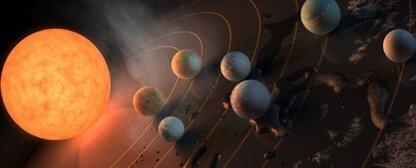New study dramatically narrows the search for advanced life in the universe

Scientists may need to rethink their estimates for how many planets outside our solar system could host a rich diversity of life.
In a new study, a UC Riverside–led team discovered that a buildup of toxic gases in the atmospheres of most planets makes them unfit for complex life as we know it.
Traditionally, much of the search for extraterrestrial life has focused on what scientists call the "habitable zone," defined as the range of distances from a star warm enough that liquid water could exist on a planet's surface. That description works for basic, single-celled microbes—but not for complex creatures like animals, which include everything from simple sponges to humans.
Source of shared Link

Source
Copying/Pasting full or partial texts without adding anything original is frowned upon by the community. Repeated copy/paste posts could be considered spam. Spam is discouraged by the community, and may result in action from the cheetah bot.
More information and tips on sharing content.
If you believe this comment is in error, please contact us in #disputes on Discord